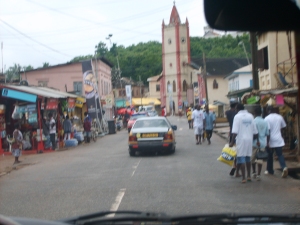I went to an international school, Machabeng High School, in a small African country, Lesotho, that has the privilege of being the only country in the world landlocked by one country. The teachers and students in my school came from all over the world and, at some stage, we had over 30 different nationalities from Sri Lankan, Ugandan, Kenyan, Egyptian, British to American, Irish, Swedish, Ghanaian and, of course, Basotho.
This diversity, coupled with a home environment that was global in its outlook & influence, ensured that my reading, from an early age, was broad. One of the areas I caught onto was the whole struggle for civil rights in the US, in particular the words & thoughts of Malcolm X. As a result, In my last year of high school, we had to write a mini-thesis and I did mine on “Writers in Times of Oppression” looking at the writings of South African and American writers, like Can Themba, Alex La Guma, Don Mattera, Richard Wright, James Baldwin and Ralph Ellison.
It was a teenage, high school piece of work so it was probably quite amateurish (don’t know where it ended up) but what it do was ensure that I grew up with an interest in and concern for African history, especially tragedies like the Atlantic Slave Trade. Over the years, I have also had the opportunity to watch various documentaries and TV programmes on the brutality of slavery and colonialism.
The two places that always seemed to stand out, whenever the subject switched to slavery, were the Island of Gorée, Senegal and Elmina, Ghana. The documentaries I had seen on these two places usually followed African-Americans on their journey back to where it all began and these were always extremely emotional experiences for them.

The streets of Elmina
I always wondered what the experience would be like for me.
When I went to Ghana, for first time since I was a baby, in December, to ‘find’ my roots, I jumped at the opportunity to visit St George Castle, otherwise known as the Elmina Slave Castle. It was a surreal experience because I spent half the time trying to figure out how I felt.

Elmina Slave Castle
There were no tears. It did not make sense to me. I felt it. The pain. The suffering. But differently. And then I realised. While I recognise the true tragedy of the slave trade and how it devastated this continent, my direct family left here on a plane. My father and grandfather (who came from this part of Ghana) and those before were birthed and bred on this land. I do not know what it is like to try and live without a clear connection to the source. I do not know what it is like to live with a history that is filled with pain and hatred and brutality and ……

The most painful part for me was the women’s cells. And how they were brutalised and abused by the men, from the Governor down …..

Door of No Return
I am not a cold soul. But the experience is different for us all.
I thought about this when I saw pictures of Barack Obama and Michelle Obama at the Cape Coast Fort.
I wondered how different their experiences were. Mr Obama: bi-racial, the son of an African man who crossed oceans in search of a better life. Mrs Obama: a descendant of slaves whose people, at some stage, went through a hellish experience at Elmina, or somewhere similar.

There is so much we still need to make sense of in this reality. In this thing we call life. The past constantly penetrates the present with its cold, hard touch.
We still have so much pain and anguish to heal.

Plaque On Wall In Memory
(Note: The images are from my trip to Elmina last week.)

